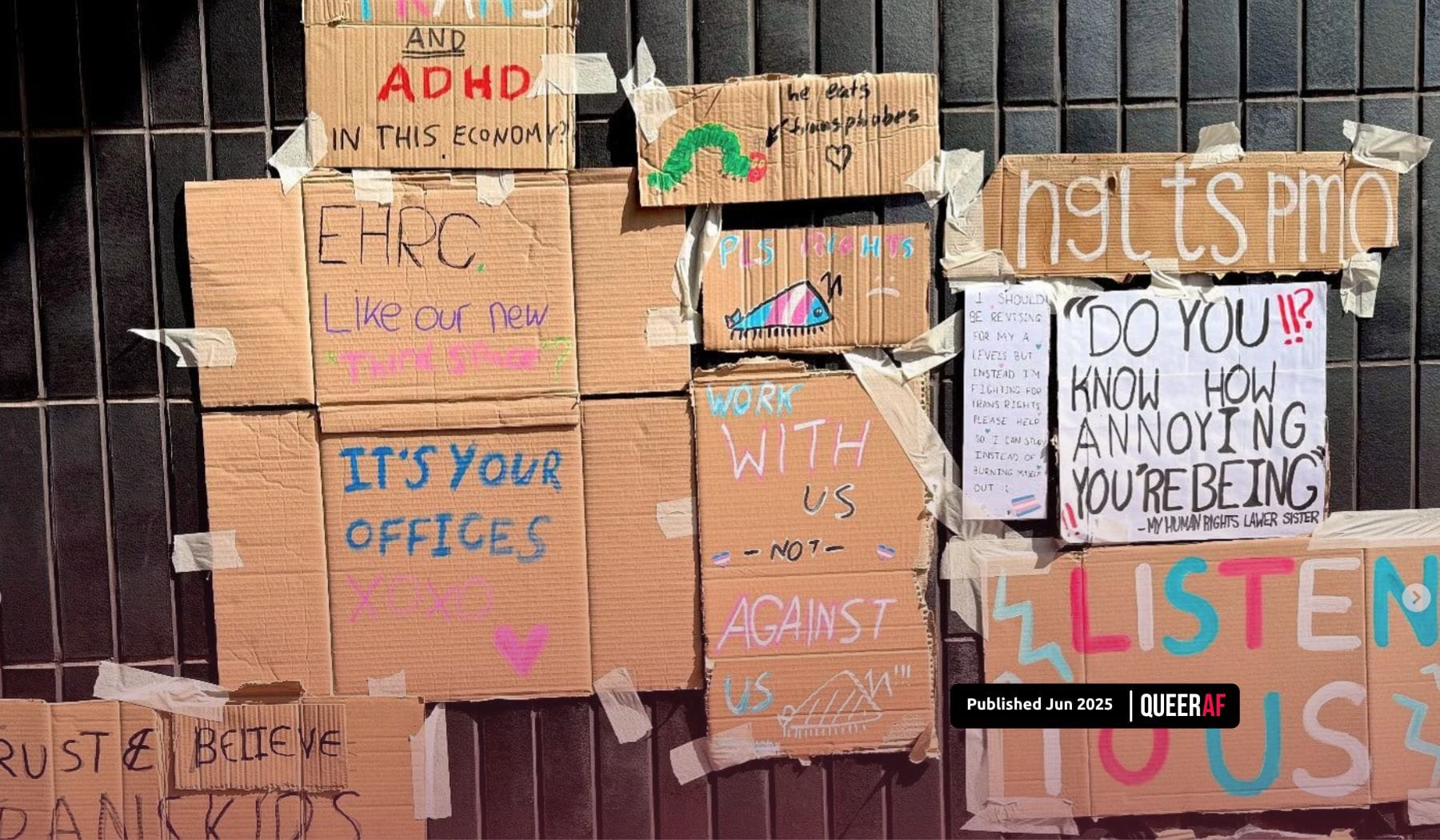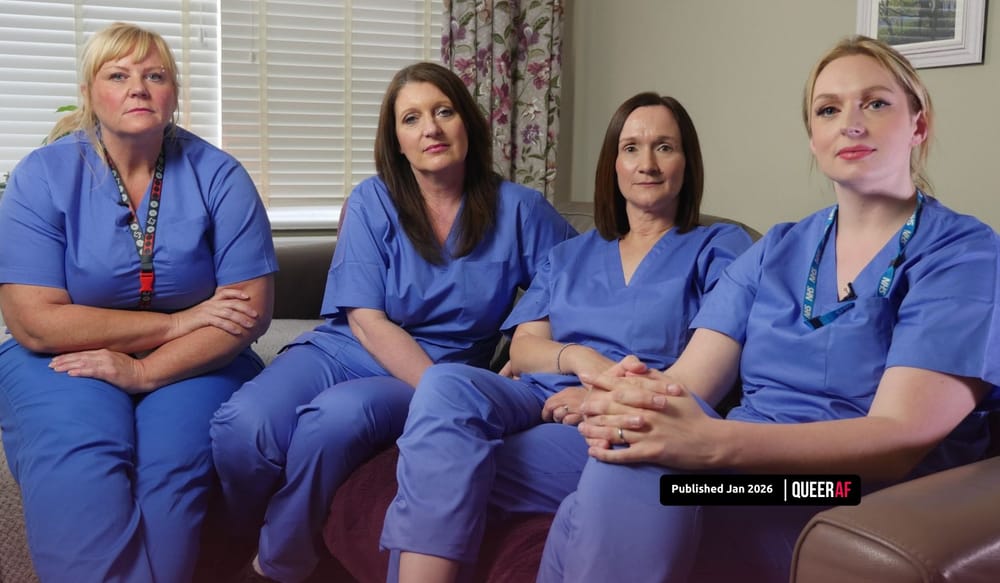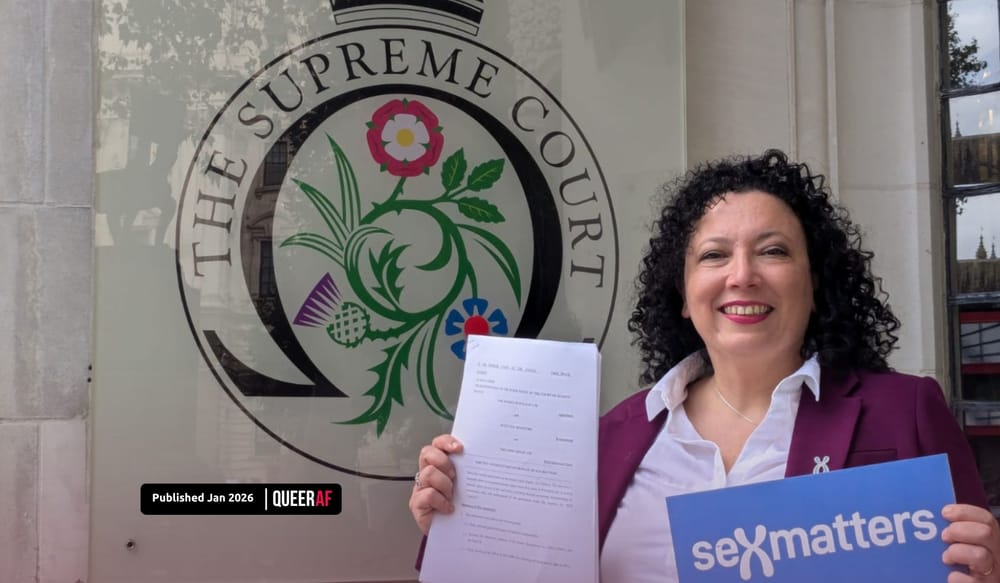TL;DR: Exclusive - The Good Law Project have filed a judicial review that sets out how the EHRC Interim Update has caused fear, humiliation and distress. They argue that not only could it land organisations who follow it in discrimination cases, but that following it could in some cases constitute a criminal offence.
Following the EHRC's advice to segregate Trans+ people from public life could in some cases constitute a criminal offence, a judicial review court filing sets out.
In its judicial review application seen exclusively by QueerAF, advocacy group The Good Law Project, on behalf of community members affected by the EHRC and Equality Minister's actions, argued that the court should call for it to be removed or to deem it in direct conflict with the UK’s obligations under the European Convention on Human Rights.
The argument sets out how a critical part of the Gender Recognition Act 2004 makes it a criminal offence to out a Trans+ person without their permission - which the EHRC guidance could do on a mass scale if implemented.
Moreover, Good Law Project founder and director Jolyon Maugham KC told QueerAF that the Equalities Minister and EHRC have gone against the Supreme Court's intention - and that's why they're challenging them in court:
"The Supreme Court promised its decision 'would not be disadvantageous to or remove protection from trans people with or without a GRC'. Bridget Phillipson and the EHRC vigorously disagree.
"This is the case where we find out who is right. Everyone who wants a kind and tolerant Britain - rather than a return to the cruelty of Section 28 - will know which side to cheer for."
What does the judicial review filing argue?
Although the EHRC's guidance was named an 'interim update', the Good Law Project's filings argue this was a misnomer, as the update in fact sets out its "settled view of the law". That view has already seen all three of the applicants’ employers change policies, leaving them in fear, humiliation and distress.
The filings set out The Good Law Project’s evidence that the guidance from the EHRC is an "inaccurate and misleading statement of the law".
Specifically, they set out the precedent set by Goodwin v United Kingdom (2002) at the European Court of Human Rights, which stated that any law which leaves Trans+ people in an "intermediate zone as not quite one gender or the other” is “no longer sustainable." This ruling was significant, and paved the way for the Gender Recognition Act in 2004, which set out the legal process for obtaining a gender recognition certificate.
The Good Law Project filings balance this ruling with a number of other human rights principles - primarily the right to privacy, which the advocacy group argues is infringed by the EHRC guidance. The claimants say that having to stop using a toilet that matches their gender, and instead use a third space, outs them to their colleagues and strips them of their privacy.
Even if the High Court finds that the publication of the update itself is lawful, part of the judicial review requests that the EHRC's advice be deemed no longer compliant with its obligations under the European Convention on Human Rights. If this happens, it opens a stronger route to challenging the judgement in Strasbourg.
Why following the EHRC advice could leave you open to discrimination and criminal cases
The evidence goes as far as to argue that organisations that follow the advice as it stands could be liable to discrimination cases or even criminal cases.
A key aspect of the Gender Recognition Act 2004 was that it made it a criminal offence to acquire protected information about gender identity and disclose it without the permission of the person it concerns.
The organisation argues that forcing Trans+ people to use a segregated bathroom may breach this if sharing their identity was not their choice and that the mere use of a bathroom designated 'only for Trans+ people' outs them in practice.
Analysis: If you can’t trust the so-called 'Equalities Watchdog', what next?
The filing comes at a critical time for the disputed regulator, with one EHRC commissioner agreeing with comments made this week that Trans+ people should accept "reduced rights". Meanwhile, Labour's preferred candidate to replace the current gender-critical chair of the organisation is also documented as having spoken at a number of anti-Trans conferences - More on both of these stories in today's newsletter
This is all part of a spectacular fall from grace for a formerly independent Equalities Watchdog that was once internationally revered. However, it's not the only organisation that has followed the same path.
Since Boris Johnson broke convention and appointed a number of Tory grandees to watchdogs, including the Charity Commission and Ofcom, bodies established to protect key sectors and public matters from the political swings of mood, these organisations have become pawns in political agendas.
If we can't trust the Equalities watchdog to protect and watch over equalities law - what does that mean for our democracy? If you've been following news from across the pond, you'll recognise all these early warning signs from Trump's America, which are being copied and pasted to the UK. The most recent example is the internal Labour Party group, 'Blue Labour', calling for Starmer to scrap DEI initiatives to win back voters.
Still, this action from multiple community members, backed by a vocal advocacy group, shows us there is hope. This fight is not only far from over - it's only just ramping up.

We face an acute period ahead of us in our community:
A time where people who hate us are feeling more and more enabled to share, spread and communicate those attitudes.
In this period of uncertainty, you can trust QueerAF to be here - in your inbox every Saturday, to ensure you have all the latest information you need to navigate the changes, and to know how to fight back.
The kind of journalism we do week in week out, goes far beyond writing the 4000 words in this newsletter every week, or spending all week newsgathering. It requires us to build relationships with queer organisations, advocacy groups and with activists to ensure our ears are on the ground, and that we can connect the dots - so you're better equipped for the fight ahead.
QueerAF is a small team; for now, I'm the only one who works here full time and on top the news I do, I work with our network of contributors, mentees on our training schemes and freelance staff - to ensure we punch above our weight. We're both small and mighty.
But I'll level with you: we need your help. QueerAF's largest source of revenue is from people like you. That's by design. We've refused ads in this newsletter because it keeps us focused on what counts, not what clicks. It helps us stay grounded with what the community needs.
If you can, please join the hundreds of other QueerAF members who ensure our small but mighty newsletter, can take on the mainstream media and deliver you the information you need for the fight ahead.










